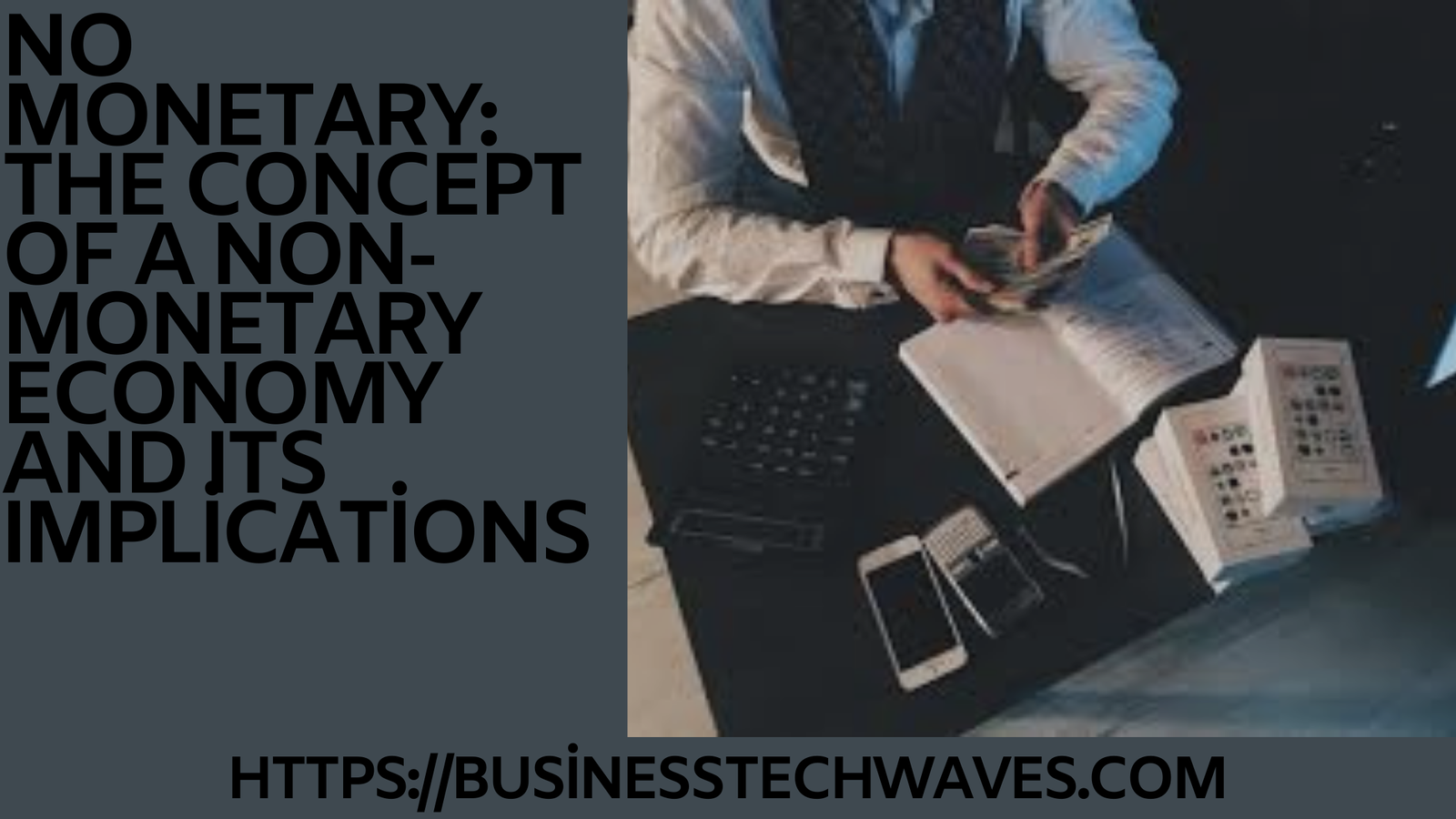
No Monetary: The Best Concept of a Non-Monetary Economy and Its Implications 2024
No monetary in a world where currency dominates everyday transactions and determines access to goods, services, and resources, the concept of a “no monetary” economy, where money has no role, might seem utopian or even impossible. However, the idea of non-monetary systems is not new, and various forms of such economies have existed or been proposed throughout history. From barter systems to gift economies, societies have experimented with ways to function without formal currency, driven by principles of cooperation, mutual aid, and resource sharing. This article no monetary delves into the concept of a no-monetary economy, its history, implications, and potential challenges in modern society.
The Evolution of Currency and No Monetary Economies
Currency as a medium of exchange has been a relatively recent phenomenon in the history of human civilization. Before the advent of money, many societies operated on systems of barter. Goods and services were exchanged directly based on mutually agreed values. A farmer might trade grain for a carpenter’s services, while a fisherman could exchange their catch for clothing. In such systems, the key was the immediate, tangible exchange of value.
Barter systems, however, were limited by a concept economists call the “double coincidence of wants” – both parties had to have something the other wanted, at the same time and place. The inefficiencies of barter gave rise to money as a more flexible and universally accepted medium of exchange. From gold coins to paper bills and eventually digital currencies, the evolution of money enabled economic growth and global trade, fostering new industries and opportunities.
But alongside this, no monetary economic systems persisted, particularly in smaller, close-knit communities. Gift economies, for example, function on the principle of generosity and reciprocity rather than immediate exchange. Resources are shared freely, with the expectation that goodwill and generosity will eventually come back in some form. Examples of gift economies can be found in indigenous cultures where resource distribution is based on social ties and communal needs rather than personal profit.
Modern Theories and Movements Toward a No Monetary Economy
In the 20th and 21st centuries, several thinkers and movements have sought to reimagine a world without money, often in response to the inequalities and environmental destruction perpetuated by capitalist systems. One such thinker was Karl Marx, who envisioned a classless, stateless society in which the means of production were collectively owned, eliminating the need for currency. In Marx’s vision, goods and services would be distributed according to need rather than purchased with money, and the alienation caused by wage labor would be eradicated.
In more recent times, the rise of automation and artificial intelligence has reignited discussions about post-scarcity economies, where advances in technology might make goods and services abundant enough to eliminate the need for money. Advocates of this idea, such as those in the Zeitgeist Movement, argue that humanity could transition to a resource-based economy, where resources are allocated based on need and scientific principles rather than market demand and monetary value.
The sharing economy, which includes platforms like Uber and Airbnb, is sometimes seen as a step toward a non-monetary system. However, while these platforms emphasize shared resources, they are still deeply embedded in monetary exchange. True no-monetary systems would need to operate without the underlying profit motive that drives these companies.
The Benefits of a No Monetary Economy
The most compelling argument for a no monetary economy is its potential to create a more equitable and sustainable world. In a monetary system, wealth is often concentrated in the hands of a few, leading to significant social and economic inequality. A system where resources are shared according to need, rather than purchased with money, could eliminate many of the injustices that arise from the unequal distribution of wealth.
Without the need to earn money, people would be free to pursue their passions and contribute to society in ways that align with their talents and interests. Artists, scientists, and caregivers, for example, could devote their time and energy to their work without worrying about how to support themselves financially.
Additionally, a no monetary system could be more sustainable. The current monetary system often incentivizes overproduction and overconsumption, as businesses are driven by the need to maximize profits. This leads to the depletion of natural resources and environmental degradation. In a system where resources are allocated based on need rather than profit, there would be less incentive to produce goods that are not necessary or beneficial.
Furthermore, non-monetary systems could foster stronger communities. In many indigenous and traditional societies, social bonds are strengthened through the sharing of resources and mutual aid. A no-monetary economy could encourage people to work together and support one another, leading to a more cohesive and cooperative society.
Challenges of a No Monetary Economy
While the benefits of a no-monetary economy are clear, there are also significant challenges to implementing such a system, especially in the context of modern global economies. One of the main challenges is how to manage the distribution of resources. In a world without money, some form of planning and coordination would be necessary to ensure that everyone’s needs are met. This raises the question of who would be responsible for making these decisions and how resources would be allocated.
In addition, human nature and social dynamics pose challenges. Throughout history, attempts at communal living and collective ownership, such as in early utopian communities or socialist states, have often been undermined by individuals seeking personal gain or power. Without a system of exchange like money, there is the potential for imbalances in contribution and consumption. Some individuals may take more than they give, leading to resentment and conflict within the community.
Another challenge is the scale of the modern economy. Non monetary systems have traditionally worked best in small, close-knit communities where trust and reciprocity are strong. In larger, more complex societies, it may be harder to maintain these values on a wider scale. The modern global economy is intricately interconnected, and a transition to a no monetary system would require unprecedented cooperation and coordination across nations and industries.
Moreover, many essential sectors such as healthcare, education, and infrastructure rely on monetary exchange to function effectively. Transitioning these systems to a no monetary framework would require radical restructuring and innovative approaches to resource allocation and management. While automation and technology might offer solutions in some areas, the sheer complexity of modern economies makes the task daunting.
Potential Pathways Forward
While a full transition to a no-monetary economy may seem distant, there are smaller-scale experiments and movements that hint at possible pathways forward. One example is time banking, a system where people exchange services based on time rather than money. In a time bank, one hour of work, whether it’s teaching a class, providing childcare, or gardening, is considered equal to any other hour of work, regardless of the type of service provided. Time banks operate on the principle of mutual aid and reciprocity, and they have been successful in building stronger, more connected communities.
Another approach is the promotion of local, cooperative economies, where communities take collective ownership of resources and businesses. Worker cooperatives, for example, are owned and managed by their employees, ensuring that profits are distributed more equitably. Community-supported agriculture (CSA) programs allow consumers to directly support local farmers, creating a more direct and sustainable connection between producers and consumers.
Conclusion: A Vision for the Future
The concept of a no monetary economy challenges deeply ingrained beliefs about how societies should function. While the transition to such a system would be fraught with challenges, it offers a vision of a world where resources are shared more equitably, human creativity and collaboration are valued, and the environmental costs of overproduction are mitigated.
Though it may not be possible to eliminate money entirely in the near future, the exploration of non-monetary systems can offer valuable insights into how we might reshape our economies to be more just and sustainable. As technological advances and social movements continue to push the boundaries of what is possible, the idea of a no-monetary future invites us to imagine new ways of living that prioritize human well-being over profit and competition. In doing so, it challenges us to rethink the very foundations of our economic systems and explore alternatives that serve the collective good.


